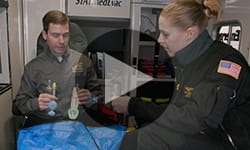
6/18/2019
 The Prehospital Airway Control Trial
The Prehospital Airway Control Trial (PACT) is an $8.8 million, four-year study, beginning at the end of 2019 that will test different strategies to help patients breathe at the scene of a trauma, to see if one works better than another at increasing survival. It is an “exception from informed consent” trial, meaning that, since the trial requires performing a potentially life-saving procedure in people who are too injured to give permission, patients who need help breathing will be enrolled. Patients will be asked for their permission for further participation once they or their family members are able to consent.
“Currently, there are two common strategies that EMS personnel use to secure a person’s airway—and both have advantages and disadvantages, so there is great debate as to which to use,” said PACT co-principal investigator Jason Sperry, M.D., M.P.H.,
UPMC trauma surgeon and section chief of trauma surgery. “What we’re trying to find out with PACT is if we can give emergency responders guidelines for which strategy to try first or what to use in different conditions to improve the odds that their patient will live. Time matters in traumas and if you aren’t using the best possible strategy first, you are losing crucial minutes to save someone’s life.”
One in five preventable deaths from trauma occur because the patient is having difficulty breathing. In the U.S., most EMS personnel will secure an injured person’s airway with either an endotracheal tube or a supraglottic device, both of which help get oxygen to an injured person’s lungs. Both consist of tubes that go through the mouth into or above the airway, which are then connected to a ventilation device—either a machine or a bag that can be pumped with the hand—to deliver oxygen to the lungs.
Endotracheal intubation requires the clinician to move the patient’s tongue aside, see the vocal chords and thread a tube between them into the patient’s windpipe. The supraglottic device also consists of a flexible tube inserted through the mouth, but instead of having to be threaded through the vocal chords, it sits at the back of the throat, above the windpipe. The supraglottic is believed to be easier to place in the field because it doesn’t require seeing the vocal chords, meaning the airway can be secured faster and with less interruption of resuscitation efforts. But, when placed correctly, the endotracheal tube may be associated with less risk of the patient breathing fluid into the lungs and other device-related complications.
“About half the time, it will take an emergency responder multiple attempts to successfully place an endotracheal tube in the field,” said PACT co-principal investigator Frank Guyette, M.D., M.S., M.P.H., medical director of
STAT MedEvac and associate professor of
emergency medicine at Pitt. “So, there is a debate in the prehospital care community as to whether EMS personnel should start by trying endotracheal intubation or if they should go straight to using a supraglottic device.”
Pitt’s School of Medicine is the clinical coordinating center for PACT, which is part of the DOD’s
Linking Investigations in Trauma and Emergency Services (LITES) research network of U.S. trauma systems and centers. Nine academic medical centers, stretching from Georgia to Oregon, are involved in the study, which will enroll more than 2,000 people age 15 and older who are taken to an adult trauma center.
Participating EMS services will start by using their normal procedures to secure an airway and the trial will collect data on patient outcomes. Then, the services will switch to trying the supraglottic airway first. If it fails, they can then decide whether to try the supraglottic again or switch to endotracheal intubation.
“Our hope is that, after four years, we’ll be able to definitively say whether it is better for patients if emergency responders immediately use the supraglottic device to secure the airway or if it is worth it to attempt to place an endotracheal tube,” said Guyette, who also is a UPMC emergency medicine physician.
Because traumatically injured patients cannot consent to the trial, they will be automatically enrolled if they fit the criteria. Once patients are stable, they’ll be notified that they were enrolled and can opt out of continued participation at that point. People can visit
www.litesnetwork.org/PACT for more information.
This research is funded by DOD contract W81XWH18F0426.
VIDEO INFO:
CAPTION: Dr. Frank Guyette discusses the Prehospital Airway Control (PACT) Trial.
CREDIT: Tim Betler/UPMC

 The Prehospital Airway Control Trial (PACT) is an $8.8 million, four-year study, beginning at the end of 2019 that will test different strategies to help patients breathe at the scene of a trauma, to see if one works better than another at increasing survival. It is an “exception from informed consent” trial, meaning that, since the trial requires performing a potentially life-saving procedure in people who are too injured to give permission, patients who need help breathing will be enrolled. Patients will be asked for their permission for further participation once they or their family members are able to consent.
The Prehospital Airway Control Trial (PACT) is an $8.8 million, four-year study, beginning at the end of 2019 that will test different strategies to help patients breathe at the scene of a trauma, to see if one works better than another at increasing survival. It is an “exception from informed consent” trial, meaning that, since the trial requires performing a potentially life-saving procedure in people who are too injured to give permission, patients who need help breathing will be enrolled. Patients will be asked for their permission for further participation once they or their family members are able to consent.















